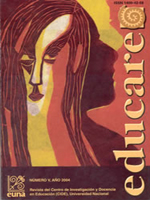Estimulación oportuna: ventajas para el desarrollo de su hijo
DOI:
https://doi.org/10.15359/ree.2004-5.2Abstract
Early stimulation presents as it’s principle that “the earlier the child learns, better and more advantages he/she will obtain from the future” (Bravo and Pons, año 1, Nº5, p.66).
The family, as a unique and first encounter for the child, supplies a fundamental role in the structure and development of the child's personality, presenting itself as main environment where the child is educated and stimulated; therefore, early stimulation starts at home.
The present article establishes the importance of early stimulation in children's objectives for life, in it’s development and educational compounds, showing the five sense in wich it can be worked, and explaining the highly significant role that the parent has in integral development of the personality in the child, in it’s physical, cognitive, psychological and social areas.
References
Arango, M. T.; Infante, E.; y López, M. E. (2002). Estimulación temprana. (Tomos I, 11 y 111). 3ra Edición y 7ma Reimpresión. Colombia: D'vinni Ltda.
Bassy, C. (1996). "La estimulaciónoportuna". En: Hacer Familia. (2), 58-61.
Bower, T. G. R. (1983). El desarrollo del niño/niña pequeño. Madrid:
Editorial Debate.
Bravo, M. Y Pons, L. (2003). "Estimulación oportuna: para que aprendan
más y mejor". En: Hacer Familia.(5), 1,66 - 70.
Breckenridge, M. ( 1973). Crecimiento y desarrollo del niño/niña. México: Editorial Interamericana.
Cerdas, A. I. ( 1995). Guía didáctica para el desarrollo y aprendizaje en niños de O a 3 años. Costa Rica: Ministerio de Educación Pública.
Craig, G. (2001 ). Desarrollo psicológico. (8va Edición). México: Prentice- Hall.
Gesell, A. (1988). El niño/niña de 1 a 4 años. España: Editorial Paidós
Educador.
Hernández, P. y Rodríguez. A. ( 1986). Manual operativo para la evaluación y estimulación del crecimiento y desarrollo integral del niño. Costa Rica: Ministerio de Salud.
Hurlock, E.B. (1990). Desarrollo del niño. México: Me Graw Hill.
León, A. T. (1998). El maestro y los niños: la humanización en el aula. ( 1 ra Edición). Costa Rica: Editorial de la Universidad de Costa Rica.
León, A.T. (1992). Desarrollo y atención del niño de O a 6 años. (2da
Edición, primera reimpresión). Costa Rica: Editorial EUNED.
Papalia, D; Wendkos, S. y Duskin, R. (2001). Desarrollo humano. (8va
Edición). Colombia: Me Graw Hill Interamericana, S.A.
Rice, F. (1997). Desarrollo humano: estudio del ciclo vital. (2da Edición). México: Prentice Hall.
Woodburn, S; Boschini, C. y Rodríguez, F. (1997). El desarrollo motor en niños. Costa Rica: Editorial EUNA.
Peñaloza, L. (2003). Documento recuperado en mayo, 2003, del
Departamento de Medicina de Rehabilitación del Hospital Infantil de Miami. En: http://www.saludhoy.com
Published
How to Cite
Issue
Section
License
1. In case the submitted paper is accepted for publication, the author(s) FREELY, COSTLESS, EXCLUSIVELY AND FOR AN INDEFINITE TERM transfer copyrights and patrimonial rights to Universidad Nacional (UNA, Costa Rica). For more details check the Originality Statement and Copyright Transfer Agreement
2. REUTILIZATION RIGHTS: UNA authorizes authors to use, for any purpose (among them selfarchiving or autoarchiving) and to publish in the Internet in any electronic site, the paper´'s final version, both approved and published (post print), as long as it is done with a non commercial purpose, does not generate derivates without previous consentment and recognizes both publisher's name and authorship.
3. The submission and possible publication of the paper in the Educare Electronic Journal is ruled by the Journal’s editorial policies, the institutional rules of Universidad Nacional and the laws of the Republic of Costa Rica. Additionally, any possible difference of opinion or future dispute shall be settled in accordance with the mechanisms of Alternative Dispute Resolution and the Costa Rican Jurisdiction.
4. In all cases, it is understood that the opinions issued are those of the authors and do not necessarily reflect the position and opinion of Educare, CIDE or Universidad Nacional, Costa Rica. It is also understood that, in the exercise of academic freedom, the authors have carried out a rogorous scientific-academic process of research, reflection and argumentation thar lays within the thematic scope of interest of the Journal.
5. The papers published by Educare Electronic Journal use a Creative Commons License:















 The articles published by Educare Electronic Journal can be shared with a Creative Commons License:
The articles published by Educare Electronic Journal can be shared with a Creative Commons License: 



